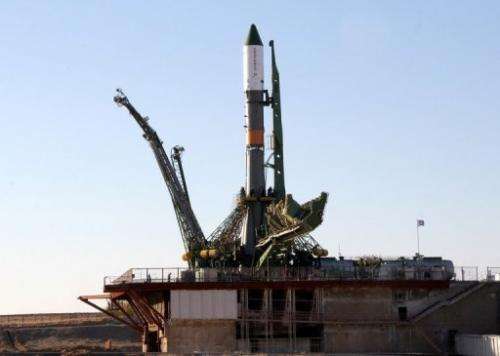A Russian Soyuz-U booster carrying Progress spacecraft, seen at the Russian leased Kazakhstan Baikonur cosmodrome, on October 29, 2012
A unmanned Progress spaceship racing to the International Space Station with 2.5 tonnes of cargo on board failed Wednesday to deploy a key antenna that helps it dock with the orbiting lab in the latest hitch in Russia's space programme.
The incident threatens to cast a new shadow over a once-vaunted programme that competed with the United States for space supremacy.
Russian and US space officials said the problem occurred just as the Progress settled into orbit after blasting off aboard a Soyuz rocket from the Baikonur space station that Moscow leases from Kazakhstan.
"There was a problem with one of the antennae in the Kurs (Navigation) system," Vitaly Lopota, president of the Energia space corporation that designs the Russian spacecraft, told the Interfax news agency.
The US space agency NASA said in a tweet: "Once in orbit, an antenna used as a navigational aid on the Progress did not deploy. Russian ground controllers are assessing a fix."
But Lopota stressed that the Progress cargo ship could still dock to the International Space Station (ISS) on Friday as planned.
"Even if the antenna fails to deploy, we will still be able to get to within 200 metres (of the ISS) and perform an automatic docking," the Energia president said.
An unnamed source at Mission Control outside Moscow told news agencies that space officials were not particularly worried about the latest mishap to affect Russia's programme.
"Such incidents have happened before," said the official.
But Russian space engineers repeatedly tried and failed to get the antenna unstuck when the Progress re-entered a stretch of its orbit in which it falls within radio contact with Mission Control.
Experts promised to keep attempting to nudge the antenna into place by sending more signals in the coming hours and possibly trying to shift the Progress vessel's rotation and angle in space.
"The antenna simply became jammed," a Mission Control representative told the RIA Novosti agency.
"We will continue trying different methods. We will be sending signals from ground telemetry stations and the space station, and turning the Progress around."
Russia's programme is being watched closely by other space powers because it remains the only nation capable of transporting humans to the ISS following the 2011 retirement of the US shuttle.
But the Roscosmos space agency has suffered from a string of problems in recent years that include the August 2011 explosion after lift-off of a Soyuz rocket carrying another unmanned Progress cargo craft.
Three months later Russia suffered another blow to its prestige after an exploration satellite destined for one of the moons of Mars got stranded in the upper reaches of the Earth's atmosphere.
It soon disintegrated over the Pacific Ocean while still carrying 7.5 tonnes of a highly toxic fuel on board. No one was injured in the incident.
President Vladimir Putin has responded to the criticism by sacking senior space officials and unveiling a new $50-billion drive for Russia to bolster its status as a top space power.
Those plans include the construction of a brand new cosmodrome from where humans will fly to space by the end of the decade.
Roscosmos said the Progress craft was carrying oxygen, water supplies and food in addition to fuel and other replacement cargo.
The 14-year-old international space lab is currently manned by two American astronauts and a Canadian as well as three Russian cosmonauts.
(c) 2013 AFP























